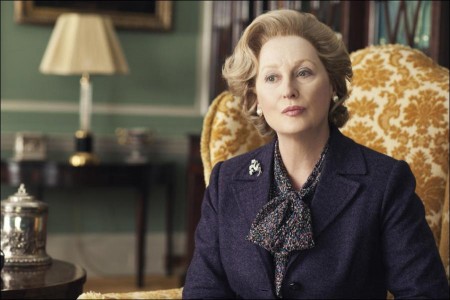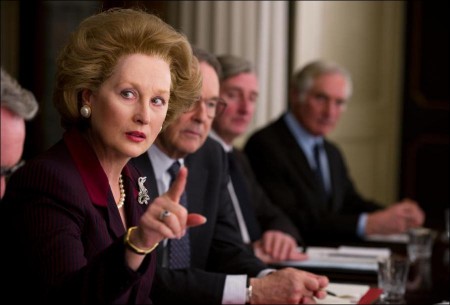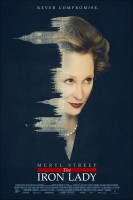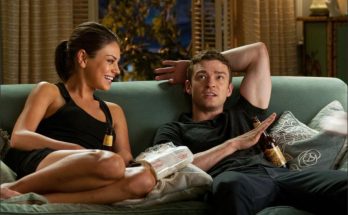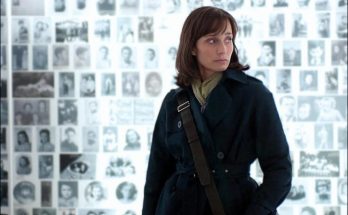Taglines: Never compromise.
The Iron Lady is a surprising and intimate portrait of Margaret Thatcher (Meryl Streep), the first and only female Prime Minister of The United Kingdom. One of the 20th century’s most famous and influential women, Thatcher came from nowhere to smash through barriers of gender and class to be heard in a male dominated world.
Contrasting the apparent powerlessness of her present-day world with the intense drama and excitement of her past, explored, entirely from Margaret’s point of view, how it might have felt – in the face of staggering prejudice of class and gender – to wrest Britain from its postwar decline. Margaret’s memories take on epic and operatic proportions in her own mind, as the grocer’s daughter from Grantham, the “lone woman in a sea of men,” doggedly wrestles with a nation in turmoil, becomes a global superstar, and is finally betrayed by her treacherous colleagues – all the while with the loyal, loving Denis in her shadow.
Interview With Meryl Streep
What was your initial response when director Phyllida Lloyd approached you to play the role of Margaret Thatcher?
When Phyllida told me she had a film that circles Margaret Thatcher’s life and the issues around a woman leader, I was immediately interested. There aren’t many women leaders; there aren’t many filmmakers who are interested in what it means to be a woman leader.
To think about the barriers that Margaret Thatcher broke through to become the leader of the United Kingdom was to put yourself in the head of a woman in the late 70s, when she really emerged as the leader of her party. It was interesting to follow someone who happened to be a woman solving big world problems, in a way that women were not expected to do in that time.
She entered a boys’ club – an upper class world – and grabbed it by the scruff of the neck. Regardless of one’s politics, that’s a significant achievement.
For me as an actor, just walking into the first day of rehearsal was incredibly daunting because there were all these wonderful British actors and I was the only woman in the room and I sort of had the feeling Margaret Thatcher must have had when she walked into the Conservative Party meetings.
The days that we were shooting in Parliament, or we were re-creating Parliament, were very interesting because how one dominates a room, how one pulls a listening audience in to persuade them of some matter of policy is something that we still struggle with as human beings.
I’ve watched women directors struggle with trying to be the commander. And women leaders, too. We’re not quite comfortable yet with this idea. Margaret Thatcher really did break ground in that she showed a way in which a woman could be a leader; she didn’t have a problem with how to lead, and so in a way, men didn’t have so much of a problem knowing how to follow. I think when women are uncertain as to how to lead, or they’re worried about how they’re perceived or they’re worried about losing femininity, their leadership skills suffer.
Two themes that emerge are having love and then losing it, and having power and then losing it. Which of those two themes was more important for you?
I think if the film succeeds, it succeeds because certain important, high-pressure moments of her political life are given equal weight with moments in her personal life that also had great reverberation for her as a human being. So we are trying to make a film about a whole human being.
Margaret states that if you take the tough decisions, people will hate you today, but they’ll thank you for generations. And that’s always the way a leader has to think.
But it’s also the way a mother has to think. You have to think, “Yes, this is painful right now. Yes, she hates me now for what I’m restricting her from doing, but she’ll thank me in the long run.” And I think these are similar concerns. When you have short-term thinking, you have a popular politician, but the long term is where we have to fix our sights.
The film is surprisingly non-political. Do you think people will be surprised by that?
I didn’t come into the film with a political agenda about Margaret Thatcher. What we tried to represent as accurately as we were able was why she was detested for her policies and also why many people thought she was great for her political choices.
It interested me less what line she toed and more what was the toll of her political decisions on her as a human being. When you’re the leader and the buck stops here, what does it do to you as a human and how much stamina does it take to stay strong?
Every day I wake up and I think, “Thank God I’m not the leader of the free world; I’m not President Obama.” Oh, what a job! One thing you really do come away with after playing a character of Shakespearean proportions is an appreciation. I feel very humble and daunted by the prospect of what she really took on her shoulders. It’s an enormous, terrifying, devastating position to be consigning people to risk of death, and then to put your head on the pillow at night. People think there is no toll and we do look at public figures as if they’re monsters or gods, and you know, the truth is everybody falls in the middle.
Do you think people will come away from the film revising their opinion of her?
I don’t know if people will revise their opinion of her policies, but at least you’ll have an understanding of the pressures that came to bear and why she seemed in her time to present an answer, and then why that answer was rejected; I think you’ll come to see that, at least.
And then after the answer she represents is rejected, you’ll see the person who lives on after that for years and years. And just like everybody else, we run through the reel in our heads, remembering the past. Humanity, we all have a common destination.
At the heart of the film is this love story, with Jim Broadbent beautifully playing Denis, himself a fascinating character. How was it working with Jim?
Jim Broadbent is so deeply funny. As an actor, even in the most serious roles, he brings an antic quality, and a quality of tender humanity that’s just very touching.
Denis Thatcher is a character who in the public eye had been characterized as a sort of buffoon. He was lampooned, but he didn’t seem to wear it with resentment and that was a really remarkable thing. We knew that Jim would anchor this character in something that had depth and an understanding of Denis’s own comic persona; what his sense of humor did to leaven both of their lives; and how important that is in a relationship to have somebody who’s willing to bring the fun.
Did you have any time prior to shooting the film with Alexandra Roach?
Alexandra Roach played the younger Margaret Thatcher, and there was a great deal of talk about how to get her beautiful little upturned nose to look like mine. But she was game and she’s a lovely, lovely actress. I just think that the relationship that she had with Harry, who plays the young Denis, was really wonderful. And the care they took with trying to make those young people have the flavor of the older ones I thought that was great; really, really good work.
What was the best part of making this picture?
The best part of making the picture was really the opportunity to look at a whole life. Because at this point in my life, you know, you do look back and you think about the whole history.
And then you also realize that what is important is the day, this moment: right here where we are right now. And you could argue that really the only important thing is to be in your life and in the exact moment in which you find yourself, and it’s the hardest thing in the world. It’s, you know, the Zen of it all, to really live where you are; feel it, be in it. We all say, when we are young, what we’re never going to do. But we all live in the same book; you know, we all begin and end. It’s an unusual ambition to aim a whole movie to that moment, the end; usually, you aim at the apogee, you aim up. And we are looking at the distillation of what it means to have a gigantic, big, full life and then to watch it subside. I mean, it’s a poem, right?
The Iron Lady
Directed by: Phyllida Lloyd
Starring: Meryl Streep, Jim Broadbent, Anthony Head, Richard E. Grant, Roger Allam, Alexandra Roach, Olivia Colman, Alice da Cunha
Screenplay by: Abi Morgan
Production Design by: Simon Elliott
Cinematography by: Elliot Davis
Film Editing by: Justine Wright
Costume Design by: Consolata Boyle
Set Decoration by: Annie Gilhooly
Art Direction by: Bill Crutcher, Nick Dent
Music by: Thomas Newman
MPAA Rating: PG-13 for some violent images and brief nudity.
Studio: The Weinstein Company
Release Date: January 13, 2012
Hits: 106
